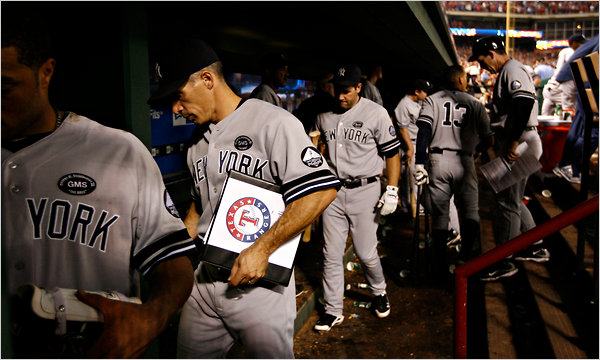Saturday October 23, 2010
When $55 Million > $207 Million
So the Texas Rangers and their $55 million payroll beat the New York Yankees and their $207 million payroll to advance to their first World Series rather than the Yankees’ 41st.
Sometimes there’s something approximating justice in the world.
I didn’t watch the game live. I would’ve watched it live but it was a friend’s birthday, and a bunch of us went to Sitka & Spruce on Capitol Hill for a lovely dinner interrupted only by me repeatedly checking the score on my iPhone. (Mlb.com has a good app; Espn.com, not so much.) At one point, I attempted to get deeper into the play-by-play, and the comfortable score I’d been looking at (5-1, Texas, in the 7th: Yay!), suddenly shifted to the horror of a 6-5 Yankees lead. (WTF!?!) It took a moment before I realized I’d click into the scores of all six games of the ALCS, and “6-5, Yankees,” was the final score of Game 1. Scrolling down, I hit the “5-1, Texas” score again, clutched my chest, breathed a sigh of relief, and decided to stay put. Moving around was apparently bad luck. Even when it wasn’t.
So I didn’t see it live. But I did DVR the game and watched it when I got home. My perceptions of the game are thus colored by foreknowledge.
I knew, for example, that when the Yankees tied it up in the top of the 5th, the Rangers immediately responded with 4 runs, so I was excited, practically rubbing my hands, when the bottom half began.
This is what I saw: infield single, groundout, groundout.
“Really?” I thought. “They get 4 runs out of this? A man on third and two outs?”
But then the Yankees intentionally walked Josh Hamilton, who was having a great series, to get to Vlad Guerrero, who wasn’t. And Vlad impaled them. He doubled over Granderson’s head in deep center to plate two.
But it was still two outs, man on second. “Really?” I thought. “They get 2 more runs out of this?”
Then Joe Girardi went to the ‘pen and brought in David Robertson. And Nelson Cruz promptly unloaded one into the seats for two more. And there’s your 4 runs.
Question: Do these two moves by Joe Girardi seem inconsistent to anyone else?
With the first move, the intentional walk, he seems to treat ALCS numbers as if they matter more than regular season numbers. He avoids the guy who’s having a great ALCS (Hamilton) to face the guy who isn’t (Guerrero), even though this means putting the first guy, who’s got speed, on the basepaths. Admittedly Hamilton had a great regular season, too, and Vlad’s not getting any younger. Plus the move worked in the bottom of the 3rd inning. But I doubt in a similar situation during the regular season—two out, man on third, bottom of 5—Girardi would’ve treated Hamilton as the second-coming of Barry-Bonds-on-steroids. It’s just not a situation where you intentionally walk a guy. Unless you think ALCS numbers matter more than regular season numbers.
Girardi’s move to go to Robertson, meanwhile, seems the opposite of this. It seems business as usual. In Game 3, in the top of the 9th, with the Rangers leading by 2 and a man on second, Girardi went to Robertson, who promptly gave up a single, a single, a strikeout, an intentional walk, a single, a single and a double, before leaving with the game out of hand: 7-0. Now if you’re treating ALCS numbers as if they matter more than regular season numbers, as Girardi did with Hamilton, you wouldn’t have gone back to Robertson in a similar situation. But Girardi did. In almost the exact same situation: the Rangers leading by 2 with a man on second. And Robertson promptly gave up a homerun and a double before leaving with the game nearly out of hand: 5-1.
So Girardi feared facing the Ranger who was having a great ALCS (SLG: 1.000), but didn’t fear putting in the Yankee pitcher who wasn’t having a great ALCS (ERA: 19.29). Feels like a contradiction in there somewhere.
After that, the Yankees seemed to deflate. They had 12 outs left and sent 14 men to the plate. Lance Berkman hit a two-out triple in the 7th, Brett Gardner drew a two-out walk in the 8th. Nothing else.
They looked old, too. Even Mariano looked old. He came in in the 8th and got ‘em out 1-2-3, but the balls were hard hit. It was also odd seeing him on the mound with the Yankees down by 5. It was like seeing the guy who normally plays Hamlet playing Guildenstern.
Jeter looked really old. He looked like he was ready to leave. After Gardner walked in the 8th, he struck out flailing. Everyone is going to focus on that final A-Rod at-bat to end the game, the series and the season for the Yanks, but their season truly ended with that final flail from Jeter. Worse, in his final two games, he didn’t even get the ball out of the infield. In Game 5: He ground out to short three times, walked, and reached on a grounder to the pitcher. In Game 6: He ground out to short, to third, to the pitcher, and struck out. Flailing. The captain went down with his ship.
Bon voyage.
Baseball's Active Leaders, 2023
What Trump Said When About COVID
Recent Reviews
Everything Everywhere All at Once (2022)
Black Panther: Wakanda Forever (2022)
Doctor Strange in the Multiverse of Madness (2022)
Spider-Man: No Way Home (2021)
The Cagneys
A Midsummer Night's Dream (1935)
Something to Sing About (1937)
Angels with Dirty Faces (1938)
A Lion Is In the Streets (1953)
Man of a Thousand Faces (1957)
Never Steal Anything Small (1959)
Shake Hands With the Devil (1959)








